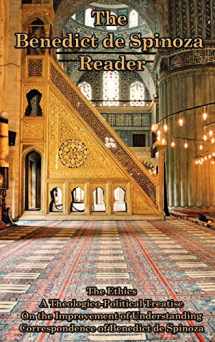
The Benedict de Spinoza Reader: The Ethics, a Theologico-Political Treatise, on the Improvement of Understanding, Correspondence of Benedict de Spinoz
ISBN-13:
9781604591606
ISBN-10:
1604591609
Author:
Benedict de Spinoza, Benedictus de Spinoza
Publication date:
2007
Publisher:
A & D Publishing
Format:
Hardcover
488 pages
Category:
Christian Books & Bibles
,
Ethics
,
Religious Studies
,
Ethics & Morality
,
Philosophy
,
Modern
FREE US shipping
Book details
ISBN-13:
9781604591606
ISBN-10:
1604591609
Author:
Benedict de Spinoza, Benedictus de Spinoza
Publication date:
2007
Publisher:
A & D Publishing
Format:
Hardcover
488 pages
Category:
Christian Books & Bibles
,
Ethics
,
Religious Studies
,
Ethics & Morality
,
Philosophy
,
Modern
Summary
The Benedict de Spinoza Reader: The Ethics, a Theologico-Political Treatise, on the Improvement of Understanding, Correspondence of Benedict de Spinoz (ISBN-13: 9781604591606 and ISBN-10: 1604591609), written by authors
Benedict de Spinoza, Benedictus de Spinoza, was published by A & D Publishing in 2007.
With an overall rating of 4.3 stars, it's a notable title among other
Christian Books & Bibles
(Ethics, Religious Studies, Ethics & Morality, Philosophy, Modern) books. You can easily purchase or rent The Benedict de Spinoza Reader: The Ethics, a Theologico-Political Treatise, on the Improvement of Understanding, Correspondence of Benedict de Spinoz (Hardcover) from BooksRun,
along with many other new and used
Christian Books & Bibles
books
and textbooks.
And, if you're looking to sell your copy, our current buyback offer is $0.3.
Description
Benedict de Spinoza's writings laid the groundwork for the 18th century Enlightenment and for modern Biblical criticism. By virtue of his magnum opus, the Ethics, Spinoza is considered one of Western philosophy's definitive ethicists. Men would never be superstitious, if they could govern all their circumstances by set rules, or if they were always favoured by fortune: but being frequently driven into straits where rules are useless, and being often kept fluctuating pitiably between hope and fear by the uncertainty of fortune's greedily coveted favours, they are consequently, for the most part, very prone to credulity. The human mind is readily swayed this way or that in times of doubt, especially when hope and fear are struggling for the mastery, though usually it is boastful, over-confident, and vain. After experience had taught me that all the usual surroundings of social life are vain and futile; seeing that none of the objects of my fears contained in themselves anything either good or bad, except in so far as the mind is affected by them, I finally resolved to inquire whether there might be some real good having power to communicate itself, which would affect the mind singly, to the exclusion of all else: whether, in fact, there might be anything of which the discovery and attainment would enable me to enjoy continuous, supreme, and unending happiness. Spinoza was one of the great rationalists of 17th century philosophy. He helped lay the groundwork for the 18th century Enlightenment and modern biblical criticism. His correspondence helps shed light on his ethical opinions and positions. Required reading for those who wish a deeper understanding of the writings of Benedict de Spinoza.


We would LOVE it if you could help us and other readers by reviewing the book
Book review

Congratulations! We have received your book review.
{user}
{createdAt}
by {truncated_author}


